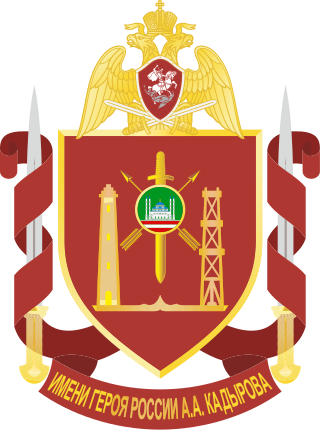
The 141st Special Motorized Regiment, also known as the Kadyrovites and the Akhmat special forces unit, is a paramilitary organization in Chechnya, Russia, that serves as the protection of the Head of the Chechen Republic. The term Kadyrovtsy is commonly used in Chechnya to refer to any armed, ethnically-Chechen men under the control of Head of the Chechen Republic Ramzan Kadyrov, although nominally they are under the umbrella of the National Guard of Russia. As of 2023, the regiment's official commander was Adam Delimkhanov, a close ally of Kadyrov.

The war in Donbas, also known as the Donbas war, was a phase of the Russo-Ukrainian War in the Donbas region of Ukraine. The war began in April 2014, when a commando unit headed by Russian citizen Igor Girkin seized Sloviansk in Donetsk oblast. The Ukrainian military launched an operation against them. The war continued until subsumed by the Russian invasion of Ukraine in 2022.

The 12th Special Operations Brigade "Azov" is a formation of the National Guard of Ukraine formerly based in Mariupol, in the coastal region of the Sea of Azov, from which it derives its name. It was founded in May 2014 as the Azov Battalion, a self-funded volunteer militia under the command of Andriy Biletsky, to fight Russian-backed forces in the Donbas War. It was formally incorporated into the National Guard on 11 November 2014, and redesignated Special Operations Detachment "Azov", also known as the Azov Regiment. In February 2023, the Ukrainian Ministry of Internal Affairs announced that Azov was to be expanded as a brigade of the new Offensive Guard.

The 2nd Battalion of Special Assignment "Donbas" is a unit of the National Guard of Ukraine subordinated to the Ministry of Internal Affairs of Ukraine and formerly based in Severodonetsk. Originally created in 2014 as a volunteer unit called the Donbas Battalion by Semen Semenchenko following the Russian occupation of Crimea and possible invasion of continental Ukraine. The formation of the unit started in the spring of 2014 during the 2014 pro-Russian unrest in Ukraine. The unit was initially formed as an independent force, but has been since fully integrated into the National Guard as the 2nd Special Purpose Battalion "Donbas" within the 15th Regiment of the National Guard.

24th Separate Assault Battalion "Aidar" also known as the Aidar Battalion, is an assault battalion of the Ukrainian Ground Forces.
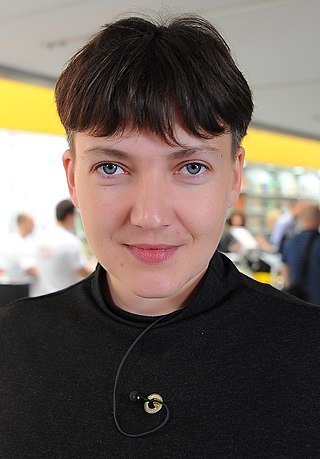
Nadiya Viktorivna Savchenko is a Ukrainian politician, former Army aviation pilot in the Armed Forces of Ukraine and former People's Deputy of Ukraine.
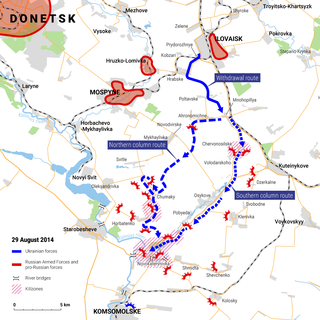
The Battle of Ilovaisk started on 7 August 2014, when the Armed Forces of Ukraine and pro-Ukrainian paramilitaries began a series of attempts to capture the city of Ilovaisk from pro-Russian insurgents affiliated with the Donetsk People's Republic (DPR) and detachments of the Russian Armed Forces. Although Ukrainian forces were able to enter the city on 18 August, they were encircled between 24 and 26 August by overwhelming Russian military forces that crossed the border, joining the battle. After days of encirclement, Ukrainian forces rejected the DPR's proposal to open a humanitarian corridor on the condition that they abandon their armored vehicles and ammunition, and on the morning of 29 August 2014 began to leave Ilovaisk with their weapons. The Russian side opened fire on the evacuating Ukrainian soldiers, many of whom died whilst trying to escape.

The Sich Battalion, officially known as the 4th Sich Company of the Kyiv Regiment, is a Ukrainian special police battalion consisting of volunteers from Kyiv. The unit was formed in June 2014 by volunteers from the far-right party Svoboda at the start of the war in Donbas.

During the ongoing Russo-Ukrainian War between the Ukrainian government forces and pro-Russian separatists in the Donbas region of Ukraine that began in April 2014, many international organisations and states noted a deteriorating humanitarian situation in the conflict zone.

The Right SectorUkrainian Volunteer Corps or simply the Ukrainian Volunteer Corps, was the paramilitary arm of right-wing Ukrainian nationalist party Right Sector. The Ukrainian Volunteer Corps was founded on July 17, 2014, as one of the "volunteer battalions", created as a response to the rise of pro-Russian separatism and the Russian intervention in the war in Donbas.

The Special Police Forces is a Ukrainian volunteer corps of law enforcement units, part of the Ministry of Internal Affairs of Ukraine. It was originally created for prevention of criminal encroachment and defence of civil order on 15 April 2014, following the Russian invasion of Ukraine. During the ongoing war in Donbas, the forces of the Special Tasks Patrol Police have fought against pro-Russian separatists as a paramilitary force.

Ukrainian volunteer battalions were militias and paramilitary groups mobilized as a response to the perceived state of weakness and unwillingness of the regular Armed Forces to counter rising separatism in spring 2014. They trace their origins to the "Maidan Self-Defense" militias formed during the Euromaidan in 2013. The earliest of these volunteer units were later formalized into military, special police and paramilitary formations in a response to the Russian military intervention in Ukraine in 2014. Most of the formations were formed or placed under command of the Ministry of Internal Affairs — as "Special Tasks Patrol Police" — and Ministry of Defence — as "Territorial defence battalions". A minority of battalions were independent of state control.
Secret prisons of SBU are secret detention facilities operated by Security Service of Ukraine (SBU) in Eastern Ukraine to incarcerate suspected Russian-backed separatists.

Taras Dmytrovych Kostanchuk is a Ukrainian public activist. He is the leader of the civil organization "Military-Patriotic Association of the ATO participants "Justice" and the former commander of the assault group of the volunteer battalion “Donbas” (2014). He is a former candidate for president of Ukraine and a candidate for the People's Deputies of Ukraine. He was demobilized in the spring of 2015.
The 2020 Kaharlyk police rape took place in May 2020 in Ukraine, garnering extensive media coverage. On May 23, 2020, police officers in the town of Kaharlyk in Kyiv Oblast (province) tortured and raped a woman who was being kept in police custody. The event caused a public outcry.
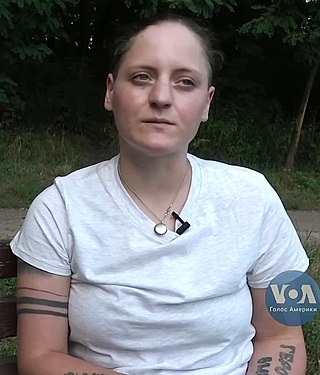
Yulia Tolopa, is a Russian-born female volunteer who fought for Ukraine in the Russo-Ukrainian War.

Since the beginning of the Russian invasion of Ukraine in 2022, the Russian military and authorities have committed war crimes, such as deliberate attacks against civilian targets, including on hospitals, medical facilities and on the energy grid; indiscriminate attacks on densely-populated areas; the abduction, torture and murder of civilians; forced deportations; sexual violence; destruction of cultural heritage; and the killing and torture of Ukrainian prisoners of war.
Victoria Ihorivna Zaverukha, better known as Vita Zaverukha, is a Ukrainian nationalist militant and ex-member of the volunteer battalion Aidar. Following Elle France's publication in 2014 of an article on pro-government female fighters in the war in Donbas, she became known for publishing neo-Nazi content on social media. In 2015, she was arrested on charges of participating in a robbery in Kyiv that resulted in the death of two policemen of the Berkut special force. A public campaign for her liberation developed from nationalist right-wing circles. She was released on bail in 2017 and later released from the investigation. Following the 2022 Russian invasion, she reportedly joined the territorial defense near Kyiv.
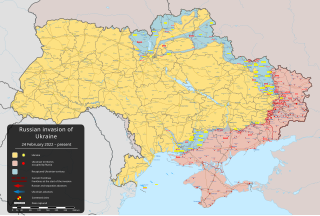
The following outline is provided as an overview of and topical guide to the Russo-Ukrainian War:

Battalion of the Special Purpose Militia Patrol Service "Shakhtarsk" is a former volunteer special unit of the Ministry of Internal Affairs of Ukraine. It was created in June 2014 in the structure of the State Department of the Ministry of Internal Affairs of Ukraine in the Dnipropetrovsk Oblast. On October 17, 2014, it was disbanded due to the discovered facts of looting. On its basis, the company "Tornado" was formed.

















